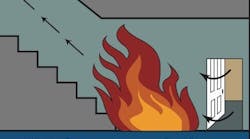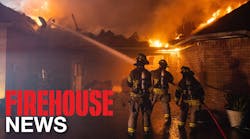In 1992, I served at the U.S. Department of Labor as a special assistant to the Secretary of Labor. My job was to accompany the Secretary around the county to events, both official and political in nature, providing whatever assistance was needed to help her prepare for the events. As the presidential election drew near, we were attending a number of political events. The one I remember most was the Vice Presidential Debate between Vice President Dan Quayle, Senator Al Gore and Admiral James Stockdale.
The moderator of the debate was a journalist named Hal Bruno. As a political junkie at the time, I knew of Mr. Bruno but only in his role as a journalist, not as a firefighter. He was a straight shooter who never revealed his political affiliation by the types of questions he would ask. (Today, you can easily determine the political bias of a moderator usually after the first question asked). Hal's questions were direct and substantive. I recall thinking at the time what it would be like to be a moderator of a major political debate, posing questions to the candidates that would force them to go beyond the political rhetoric and offer substantive answers on policy issues.
Here we are, it's 2008 and it looks like I won't be able to fulfill my Walter Mitty fantasy. Instead, Chris Mathews, George Stephanopoulos, Charlie Gibson and a select group of political commentators are denying me my dream. But if the call were to come from any of the major networks, I would have my list of questions ready.
For the most part, we know where the candidates stand on the broad issues of the economy, health care, the environment and foreign policy. But we haven't heard much on homeland security issues, or public safety for that matter. I have yet to hear any of the candidates talk specifically about addressing the ongoing challenges of our nation's fire service. That would change if I were given that one golden opportunity to moderate a debate. After starting the debate with questions about funding for the FIRE Act and SAFER, I would roll up my sleeves and begin a line of questioning that would reveal the candidates philosophies with respect to the relationship between the federal government and the fire service. Here's my list.
- The Department of Homeland Security has been plagued by repetitive reorganizations. Various agencies are continually shifted around the department hampering their ability to perform. Following the events of Hurricane Katrina there was much debate about the fate of the Federal Emergency Management Agency. Following the advice of the fire service and other emergency responders, Congress chose to leave FEMA within DHS and actually took steps to strengthen the agency. However, some have continued to call for FEMA to be removed from DHS and stood up as an independent agency. What role would your administration envision for FEMA? Would the agency remain in DHS, and if so what position would it occupy in the department?
- There has been a lot of discussion about the lack of recognition for EMS as it relates to federal funding and advocacy. Would you support a separate grant program and a new federal agency for EMS, despite concerns raised by the fire service that these proposals would be to the detriment of fire service-based EMS?
- Each year, wildland/urban interface fires destroy hundreds, if not thousands of homes, and threaten the lives of individuals who chose to live in the wildland/urban interface. For developers, the credo is "Build it and they will come." How can the federal government effectuate change to limit the rapid development of the wildland/urban interface?
- Following the tragic nightclub fire in West Warwick, RI, that claimed the lives of 100 victims, legislation was introduced to provide tax incentives for the installation of automatic fire sprinkler systems in public buildings. The Fire Sprinkler Incentive Act continues to languish in Congress. Would you, as President, call on Congress to pass this legislation which would accelerate the depreciation on sprinkler systems from 29 years to five years?
- The volunteer fire service faces a serious problem in recruitment and retention of volunteer firefighters. While a number of departments are addressing the problem by augmenting the staff with career firefighters, many departments faced with budget constraints cannot afford this option. Another alternative that Congress is considering is to provide tax incentives for the recruitment and retention of volunteer firefighters? Would your administration support this type of legislation?
- In recent years, Congress has considered legislation that would grant collective bargaining rights for career firefighters. The legislation has been carefully crafted so it would not infringe on the rights of volunteer firefighters. Would your administration support legislation that would grant collective bargaining rights for career firefighters?
- There is a saying in the fire service that "saving lives starts with prevention." Each year, we lose over 3,000 people in fire-related tragedies and thousands more suffer serious injuries. What role does the federal government have in public safety education? Would you support additional funding for the United States Fire Administration to expand its mission in fire safety education, enabling the agency to broaden its work through partnership with widely recognized organizations whose mission includes public fire safety education?
- We are all painfully aware of the terrible events of September 11th and, later, the disastrous aftermath of Hurricane Katrina. They both had one major thing in common - the breakdown of communications among emergency services organizations. To address this and to improve everyday emergency communications, the Federal Communications Commission is trying to establish a public/private partnership to create a nationwide public safety mobile interoperable broadband network. Spectrum is currently being auctioned to find a suitable private company to partner with public safety to build out such a network. Do you fully support this ambitious effort?
As moderator, I wouldn't draw any particular conclusions from the candidates' answers; that would be your job. However, the one job we share is to make sure we all vote. Hopefully, the surge in voter turn-out in the Democratic primaries will carry over into the general election with record numbers of Democrats and Republicans alike exercising their constitutional right to vote. You can say this about any presidential election, but this is perhaps the most important election in recent history. Given the war in the Iraq, the anemic economy, the immigration quandary and other challenges confronting our country, we each have a responsibility to participate in the electoral process.
I would encourage you to learn as much about the candidates as possible. When speaking at fire service functions, I always encourage my audience to take full advantage of the internet to learn as much about their elected officials as possible. The IAFF, IAFC and NVFC all have sections on their websites containing lists of their legislative priorities. Using these lists, you can access a Library of Congress website called "THOMAS" to see if the incumbent candidates have supported these initiatives. The address is thomas.loc.gov.
The one thing I look forward to on Election Day is wearing a sticker on my lapel that says "I voted." You should too.
To see what legislation is currently going through Washington D.C., visit the Congressional Fire Service Institute's Current Legislation Page. Find out how to contact your local member of Congress and view a sample letter. To learn more about the legislative process, click here.BILL WEBB, a Firehouse.com Contributing Editor, is the Executive Director of the Congressional Fire Services Institute (CFSI). Established in 1989, CFSI is a nonprofit, nonpartisan policy institute designed to enhance Congressional awareness about the concerns and needs of the fire and emergency services. In his capacity, Bill works closely with members of Congress and fire service leaders on developing federal legislation to improve the readiness of our nation's fire and emergency services. Previously, he served in the first Bush Administration as Director of Advance at the U.S. Departments of Education and Labor, traveling across the country and abroad organizing events for the Secretaries. To read Bill's complete biography and view his archived articles, click here.





